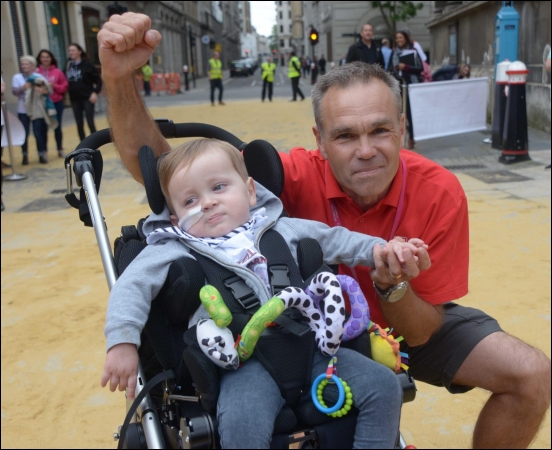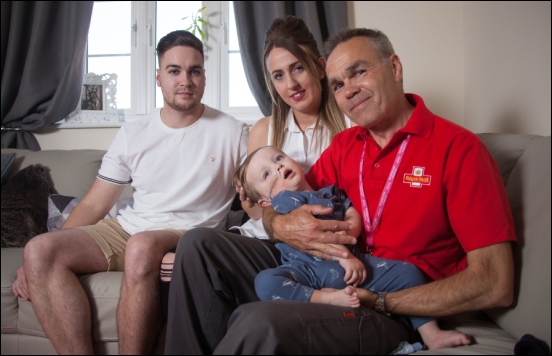An amazing Burnham-On-Sea Royal Mail postman has raised more than £55,000 for charity by completing the final leg of his emotional 500-mile fundraising walk from Edinburgh to London this weekend.
Mark Penfold began his incredible trek on May 27th and reached the finishing line at the Guild Hall in London on Saturday (June 18th) where he was led in by a horse-drawn postal carriage, pictured here.
He was given a rousing welcome by family, friends, supporters and colleagues from the Royal Mail.
Mark has been raising money for the Lily Foundation, a charity that’s close to his heart because his grandson, 18-month-old Frankie, suffers from life-limiting Mitochondrial Disease, which affects the central nervous system and has no known cure.

Speaking to Burnham-On-Sea.com, he said: “It’s great to have finished and to have raised such a great total – it’s been a great effort from so many people and I thank everyone who has supported me.”
“I always say that if I didn’t raise more awareness about Mitochondrial Disease then I wouldn’t be happy. I want as many people to be aware of it as possible so the help available to sufferers increases and hopefully a cure can be found in the future.”
Mark has raised over £55,000 with Royal Mail providing £25,000 as part of the group’s celebration of 500 years of the postal service.
During the walk he picked up an ankle injury and a nasty sore on his right foot but was determined that these would not stop him.

“The support has been amazing, with so many messages from people backing me and I am hugely grateful to everyone.”
For Saturday’s final section of the walk he was also joined by cricketer Phil Tufnell, who walked with him to the finish line over Tower Bridge.
Mark began his incredible walk from a postal delivery office in Edinburgh, and has been cheered on by colleagues and family as he walked the former London to Edinburgh postal route, one of the oldest postal routes in the UK.
The Burnham-On-Sea postie joined Royal Mail’s 500 year celebrations in the capital during Saturday.

Mark, 50, has followed in the footsteps of ancient postal carriers to mark 500 years of the postal service.
“Thinking of Frankie spurred me on to the finish line,” he said. “I can’t thank Royal Mail, my colleagues and the Communications Workers Union enough, for the first class help, support and organisation it has taken.”
The Lily Foundation funds research to improve diagnosis and increase treatment options for Mitochondrial Disease, and ultimately find a cure. The charity also raises much needed awareness of the condition and support families affected by Mitochondrial Disease.
Also see:
![]() Click here to find out how to make donations towards Mark’s fundraising
Click here to find out how to make donations towards Mark’s fundraising
.What’s Mitochondrial Disease?
 Every twenty minutes a child is born who will develop Mitochondrial Disease by the age of 16.
Every twenty minutes a child is born who will develop Mitochondrial Disease by the age of 16.
There is no cure for this disease which is for many debilitating and life limiting like little Frankie.
When a person has Mitochondrial Disease the Mitochondria in the cells are not producing enough energy for the cells. Sometimes they do not work at all, and sometimes they are just not very efficient.
If a cell does not get enough energy (ATP) it cannot function properly. There is a huge variety in the symptoms and severity of Mitochondrial Disease. It depends on how many cells are affected, and where they are in the body.
Every person with Mitochondrial Disease is affected differently. Each individual affected will have a different combination of Mitochondria that are working and not working within each cell.
However, there are times when particular body systems are affected in a recognisable pattern and these have particular names, for example Alpers, Leigh’s disease, MELAS and MERRF. The commonest parts of the body affected are those that have the highest energy demands; brain, muscle, liver, heart and kidney.
If a lot of Mitochondria in the body are affected in the important body organs, like the brain, Mitochondrial disease can be very serious.
The symptoms of Mitochondrial Disease are usually progressive in body systems where the cells have a high demand for energy, such as brain cells.
Is there treatment? Unfortunately there is no cure for Mitochondrial Disease at present. Treatment is usually supportive to relieve the symptoms demonstrated, for example treating seizures with medication.
Doctors can also try to make the respiratory chain more efficient by using a co-factors and vitamins. Examples of these are Ubiquinone (Co-factor Q10), Thiamine and Riboflavin.
Some people find that using a special diet can help, and this varies depending on which part of the respiratory chain is affected. Any metabolic stress on the body, for example an illness, has the potential to cause a worsening or progression of Mitochondrial Disease, as the cells may not be able to cope with the extra demand placed upon them.
It is difficult to live in a world where all potential metabolic stresses are removed, but it is important to be aware, so that early medical advice and treatment of any illness can be started.
The Lily Foundation is currently supporting research initiatives at Guy’s and St Thomas’/Evelina Children’s Hospital, Newcastle University and Great Ormond Street Hospital/ Institute of Child Health and Sir John Radcliffe Hospital, Oxford.
By funding this work, it’s hope to enable doctors to get a better understanding of how mitochondria function. This will help identify new disease causing genes and improve the speed and accuracy of diagnosis. This will also lead to the development of effective treatment options, techniques to prevent transmission and ultimately to find a cure.











